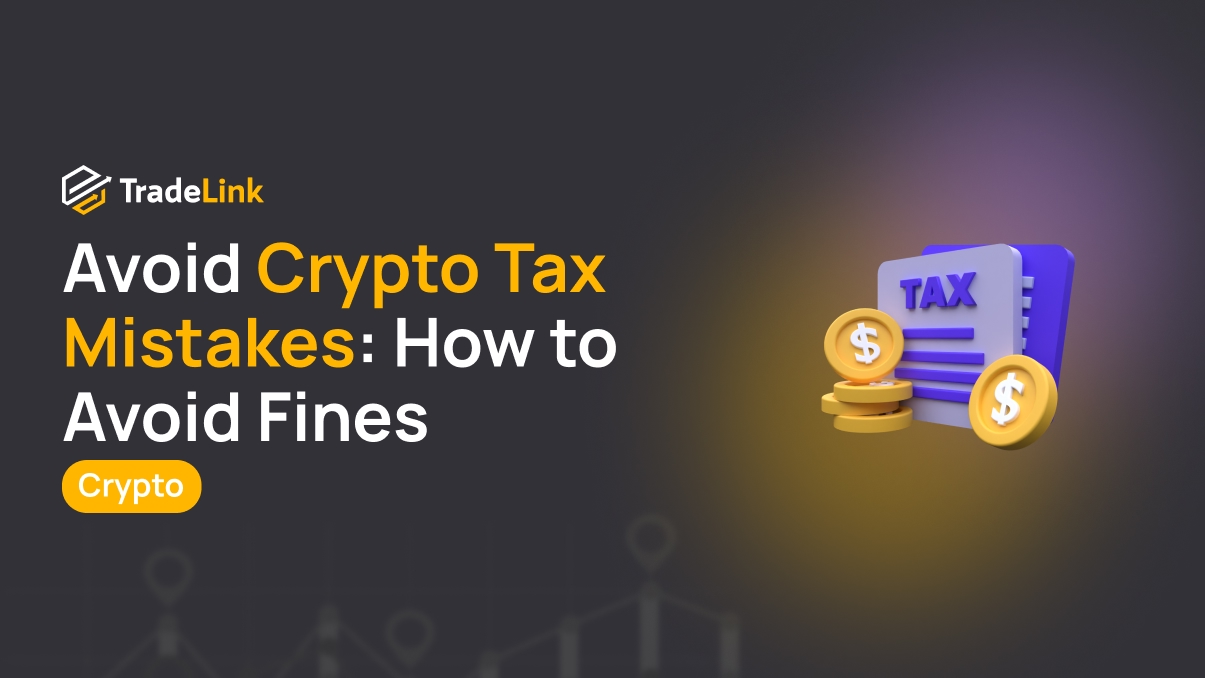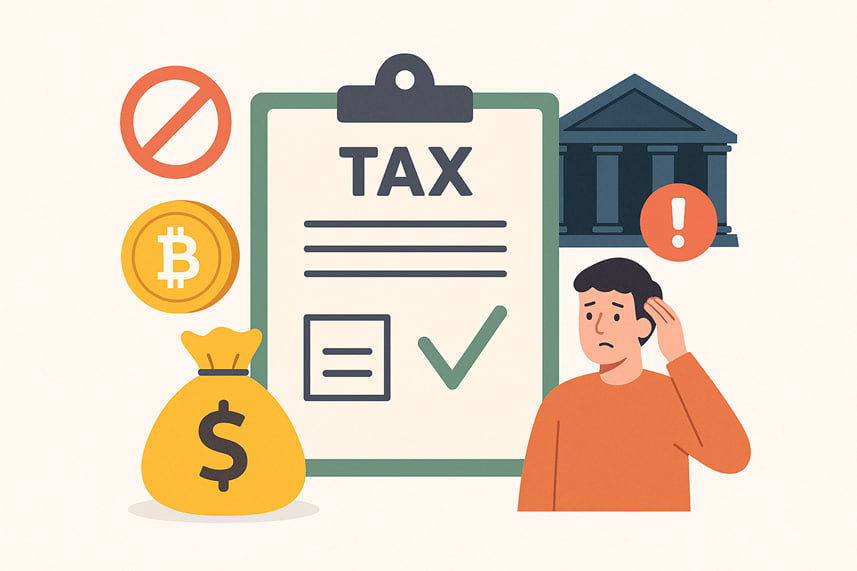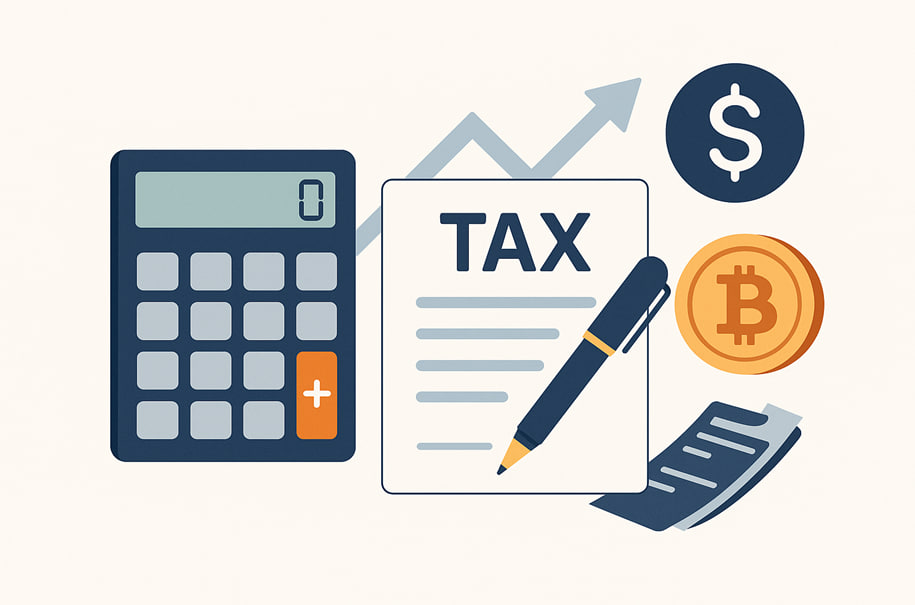Avoid Crypto Tax Mistakes: How to Stay Compliant and Avoid Fines

Contents
- Introduction
- Why You Should Declare Cryptocurrency
- Common Mistakes in Tax Payments
- How to Correctly Calculate Tax
- Tax Reporting Tips
- When to Consult a Specialist
- Conclusion
Introduction
In 2025, the topic of cryptocurrency taxation has become especially important. More and more countries are introducing laws that require traders and investors to report their digital assets. Previously, many considered crypto to be a “grey” instrument. Now the rules have become clearer, and ignoring them is no longer an option. If you buy, sell, or store cryptocurrency, it’s essential to understand how crypto taxes work and how to avoid problems. This article will help you understand why it’s necessary and how to act correctly.
Why You Should Declare Cryptocurrency

Many people think that if cryptocurrency is not held in a bank, no one will know about it. However, tax authorities are increasingly gaining access to exchange data and tracking the movement of funds. If a person trades cryptocurrency, receives income from mining, or transfers funds between wallets, it can be considered a taxable event.
Declaring cryptocurrencies is not just a formality. It helps avoid fines, account freezes, and other tax-related issues. If income is hidden, the debt can be collected through the court. In some countries, tax evasion is even subject to criminal liability.
It’s better to file a declaration on time than to prove that everything was legal later. The law states that the sooner you report, the less you pay. Today, tax risks are not abstract; they are a real threat to any crypto investor.
Key Tax Obligations
Cryptocurrency taxes depend on what kind of transactions a person performs. Here is a list of the most common activities that may be subject to taxation:
-
Buying and selling cryptocurrency. If you bought Bitcoin for $10,000 and later sold it for $15,000, you must pay tax on the profit.
-
Exchanging one cryptocurrency for another. Even if you don’t cash out to fiat, the operation is considered taxable.
-
Mining. Income from mining is treated as business income in most countries, and income tax must be paid on it.
-
Staking and farming. Rewards from these processes are also considered income. They must be included in tax reports.
Tax rates may vary. Some countries apply a fixed profit rate, others use a progressive scale. Sometimes, taxes depend on the holding period of the asset. For example, the rate might be lower if you held a coin for over a year.
Legislation in Different Countries
Tax regulations on cryptocurrency vary from country to country. Some have strict rules and mandatory reporting, others have a more lenient approach or no taxation. To avoid issues, it’s essential to understand the regulations in your jurisdiction and others, especially if you use international exchanges or P2P platforms.
Below is a brief comparison of cryptocurrency tax approaches in 2025:
Country | Tax on Crypto Sale | Crypto-to-Crypto Taxed | Mining / Staking | Reporting Required |
USA | Yes, on all profit | Yes | Yes, as income | Yes, since 2024 (Form 1099-DA, etc.) |
Germany | Yes, if held < 1 year | Yes | Yes, as income | Yes |
Japan | Yes, progressive rate (up to 55%) | Yes | Yes, as miscellaneous income | Yes |
UAE | No | No | No | No |
Russia | Yes, if income is confirmed | Yes | Yes, as income (personal income tax) | Yes, since 2021 (upon notifying the tax service) |
Each country regulates digital assets differently. Knowing your local law and monitoring changes is essential, especially if you use international exchanges. Cryptocurrency laws are becoming stricter, and tax authorities can request information about your transactions anytime.
Common Mistakes in Tax Payments

Mistakes in paying crypto taxes are common. Even experienced traders sometimes get confused with calculations. The most common issue is miscalculating income. For example, a person may not factor in the purchase cost of a coin or forget about exchange fees. This distorts the final amount and affects the tax.
Another frequent mistake is ignoring small transactions. If the amount is small, it can be omitted. However, tax authorities may consider any transaction significant.
Many also incorrectly fill out declarations, leading to misunderstandings with tax agencies. Errors in codes, missing fields, and date discrepancies can all result in fines or clarification requests.
Incorrect Transaction Accounting
To pay taxes correctly, it’s essential to track all cryptocurrency operations. But in practice, this is often difficult. People don’t save transaction histories, lose access to old wallets, or forget the rate at which they bought the coins.
It becomes especially tricky if someone actively trades on exchanges. They may forget which deal was first and which was last. Sometimes, duplicates or missing entries appear, making it hard to calculate income accurately.
To avoid confusion, it’s best to use specialized software. These tools collect data from exchanges and generate reports. They help track coin movement, account for fees, and keep records for tax reporting.
Declaration Errors
Filing a declaration is an important step. But many people rush it and make simple mistakes. For example, they choose the wrong type of income. Some earnings fall under trading, others under mining or staking. Using the wrong code can lead to overpayment or penalties.
Another mistake is missing submission deadlines. In some countries, a fine is charged immediately after a delay. It’s better to know when and where to submit the documents.
Incomplete information is also common. People forget to report part of their income, especially if they’ve made many different transactions. However, tax authorities can request reports from exchanges and spot discrepancies.
To avoid problems, follow instructions and refer to official examples carefully. If in doubt, consult a professional.
How to Correctly Calculate Tax

To avoid trouble with tax authorities, it’s essential to know how to calculate income tax on cryptocurrency correctly. It’s not as difficult as it seems. The key is understanding how the taxable base is formed.
First, you need to determine the income amount. It’s the difference between the sale price and the purchase price. For example, if you bought a coin for $100 and sold it for $300, your income is $200. This is the amount you must report.
If an exchange fee was charged, it can be deducted. The same applies to transfer fees. These costs reduce your income and, therefore, your tax.
Exchanging one cryptocurrency for another is also considered a taxable event. So it’s essential to account for each transaction, even if no fiat was involved.
Using Tax Calculators
Calculating everything manually is complex and time-consuming, especially if there are many transactions. In this case, online calculators are helpful. These services automatically calculate income and tax.
They connect to your exchange accounts and collect trade data. Then they generate a report showing how much was earned and how much must be paid.
Some calculators support CSV file imports. This is useful if the exchange doesn’t support direct connection. You simply export your trade history and upload it to the service.
-
CoinTracking — transaction tracking, tax reports, exchange imports
-
Koinly — supports tax reporting in multiple countries, with a user-friendly interface
-
Accointing — portfolio analytics, trade imports, report export
All of these services offer free plans that are sufficient for beginners. However, a paid subscription may be required if you have a high volume of transactions.
Accounting for Exchange Rate Differences
Cryptocurrency prices are constantly changing. So it’s essential to consider the exchange rate at the time of each transaction. This rate determines the tax amount.
If a person buys a coin for $100 and sells it when the rate rises to $150, the tax is calculated based on that difference, not the current rate, but the one at the time of the transaction.
Record the rate on the purchase and sale dates to avoid mistakes. You can do this using exchange reports or dedicated services. Some calculators insert the rate automatically.
The difference between actual income and calculations can be significant without proper tracking, leading to overpayment or fines. It’s best to keep records of each transaction from the start — it makes tax filing easier.
Tax Reporting Tips

Tax authorities require proof of income and transactions. Collecting all the data in advance is better to avoid stress and wasted time. Start with your trading history from the exchange. Most platforms allow you to export it as a table, usually in CSV format.
You should also save receipts if the purchase were made via an exchanger. Sometimes it’s helpful to take screenshots of balances and transactions. These documents will support your case if the tax office raises questions.
A reliable method is to use a tracking service. It collects all transactions, calculates income, and shows how much tax is owed. The key is not to lose access to your data and not to postpone preparation until the last moment.
When to Consult a Specialist
Sometimes, handling taxes alone is not the best option. If someone has a lot of transactions, trades on multiple exchanges, or uses DeFi protocols, it’s better to consult a professional.
A tax consultant knows how to calculate profits correctly, complete the declaration, and account for all nuances. This is especially important for international transfers or complex token operations.
You should also seek help if past reports contained mistakes. A specialist can help correct them and avoid penalties. Paying for a consultation is better than dealing with tax issues later.
Conclusion
Cryptocurrency taxes are a formality and part of every investor’s responsibility. If a person understands the rules and keeps records, they reduce the risk of fines.
In 2025, tax authorities are paying closer attention to digital assets. So it’s best not to delay report preparation. You must gather documents, calculate income, and file declarations on time.